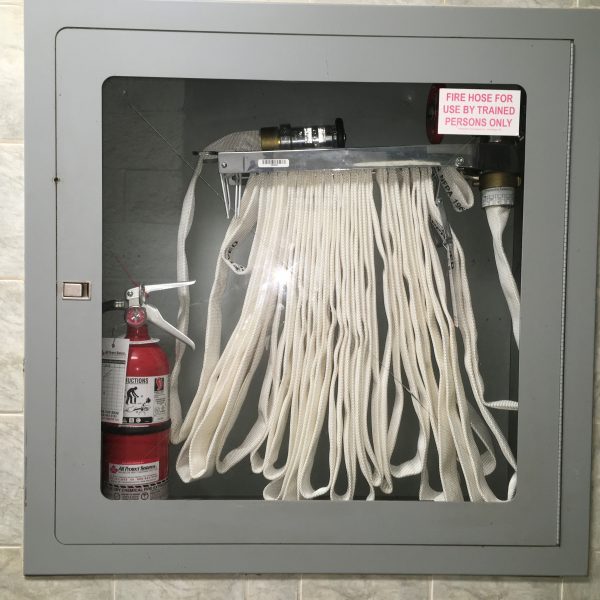
Ontario Fire Code
Modern occupant fire hoses have several components and the Ontario Fire Code mandates separate inspection schedules and procedures for them. A part of the Ontario Building Code, the Fire Code, ensures that Ontario’s municipalities maintain by proper fire safety guidelines.
The Ontario Fire Code is a regulation under the Canadian Fire Protection and Prevention Act, 1997. Its most recent revision took place in July 2019.
Fire Hose Cabinet Require Monthly Inspections
Fire hose cabinets are the boxes that house the fire hose when it’s not in use. Red or white in color, they’re usually made of a combination of metal and glass or plastic. They accommodate the fire hose and sometimes a portable fire extinguisher as well.
Professional and qualified personnel should conduct monthly inspections on all occupant use hoses. Always follow manufacturer instructions, but most inspections should include the following observations and corrective actions:
- Check for broken or opaque glass or plastic on the cabinet. Clean or replace as necessary.
- Make sure that the cabinet is correctly labeled and accessible. If necessary, replace or install new “Fire Hose” or “Fire Extinguisher” signs and remove objects that interfere with access.
- Inspect the metal portion of the cabinet for problems. If damaged, repair or replace broken items or the entire assembly.
- If the cabinet is a glass break style, make sure the lock is working, and the glass break hammer is attached next to the instruction decal. Repair or replace the lock, hammer, and instruction sticker if necessary.
- Ensure that the cabinet door can open a full 180 degrees. If it can’t, you must relocate it or remove the interfering object.
- Make sure that all components in the fire hose cabinet are easily accessed. These items include the hose, valves, nozzles, and fire extinguishers. If not accessible, remove any unnecessary materials from the cabinet.
- Fire extinguishers should be fully charged with the pull pin and seal present. The nozzle should be free of any obstructions.
Fire Hose Annual Inspections
The steel hose rack and fire hose are inside the fire hose cabinet, and it requires a thorough annual inspection. During which, a trained professional must examine fire hose cabinet’s contents, such as:
Steel Hose Rack
- Check to see if the fire hose folds correctly over the pins and rerack it after inspection. If the rack is a semi-automatic style, make sure a retaining device secures it.
- Make sure the nozzle fits into its clip, and the clip is mounted correctly. Remount or replace the clip if required.
- Verify that nothing can prevent the hose rack from swinging out 90 degrees from the cabinet.
Angle Hose Valve
- Make sure the Handwheel is the correct size and attached to the valve.
- Verify that the valve has water, and none is leaking. Repair or replace if necessary.
Fire Hose
- Look for any damage to the hose sections or couplers. Replace if necessary.
- Make sure that the coupling threads match the local fire departments. Replace or supply adapters if necessary.
- Be sure the hose connects to the hose rack nipple, and there’s free access.
- Verify the hose is in good condition, UL listed, not too old, and tested according to the NFPA.
Hose Rack Nipple
- Verify that the hose rack nipple is securely attached to the angle hose valve through the hose rack opening.
- Check the hose rack threading for damage, and replace if required.
Nozzle
- Verify that you have the correct nozzle for the environment, such as a class A, B, or C fire.
- Check the nozzle gasket and replace if necessary.
Occupant use fire hoses are vital elements for building safety and required by law. Regular inspections by qualified personnel ensure that your building remains up to code.
All Protect Systems, Inc. has trained and experienced personnel that specialize in these monthly and annual inspections. In fact, you can rely on them for all your fire safety needs. Call us today to make an appointment.